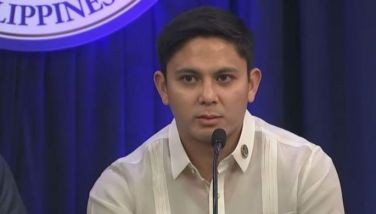Senate, House reopen dengue vaccine probe
MANILA, Philippines — The two chambers of Congress will reopen their investigation into the Department of Health’s P3.5-billion dengue fever immunization program of the previous administration following reports of irregularities.
After more than a year since its last hearing, the Senate Blue Ribbon committee resumes today its investigation into the government’s controversial dengue vaccine program that reportedly exposed tens of thousands of vaccinated children to life-threatening risks.
A key committee of the House of Representatives yesterday served notice that it will reopen its investigation.
Surigao del Sur Rep. Johnny Pimentel, chairman of the committee on good government and public accountability, made the disclosure following new material information about Dengvaxia’s safety and the program’s dubious funding.
“We will renew our probe in light of Sanofi Pasteur’s admission that Dengvaxia is unsafe for people who never had dengue fever, plus evidence that payments for the supplies of the vaccine were not authorized in the 2016 General Appropriations Act,” he said.
Pimentel said when his panel first investigated the DOH’s controversial school-based dengue immunization program, Sanofi had not yet acknowledged that Dengvaxia could worsen symptoms for vaccinated people who contracted the disease for the first time.
“Also at that time, the committee was not aware that funding for the vaccine was simply sourced from budget savings, which might be illegal,” Pimentel said.
Another panel, the committee on health, also conducted an inquiry into the matter.
Based on the Pimentel committee’s initial review, he said it was clear there was “unwarranted haste” in getting Dengvaxia approved for use on Filipino children, and to adopt an aggressive inoculation plan using the world’s first-ever licensed dengue vaccine.
“Many of us in the committee were in fact dumbfounded by the excessive rush to allow the use of the vaccine and to get the program going,” Pimentel said.
“Questions were raised as to why we had to be the first country in the world to launch in April 2016 a public inoculation plan against dengue when the DOH could have simply waited for the results of further studies as to the safety and efficacy of Dengvaxia,” he said.
Another lawmaker, Rep. Winston Castelo of Quezon City, expressed his support for a joint congressional inquiry with all concerned committees if only to prevent further damage that put at risk the health and lives of thousands of Filipino children.
“The program appears to have been rushed – without a complete assessment of the vaccine’s risks and benefits,” Castelo, chairman of the committee on Metro Manila development, said.
He asked the health committee to investigate the circumstances of the DOH’s dengue vaccination program, whether or not it underwent a thorough risk-benefit analysis, who should be held accountable, and how the risks to the vaccinated children could be mitigated.
The DOH has suspended the program.
The suspension came following the announcement by Sanofi of the findings of its latest studies.
Castelo noted that the DOH failed to consider the long-term impact of the vaccine because it did not wait for the results and analysis of the six years of clinical trials before deciding to go on a massive vaccination program.
“Unless there was a compelling reason that outweighed the risks, a mass immunization program using a new vaccine should wait for complete results and analysis of long-term clinical data,” he said.
As things turned out, the DOH spent P3.5 billion and injected almost 800,000 children with a vaccine whose long-term safety had not been completely established, the administration lawmaker pointed out.
Senate resumes hearing
The Senate committee on health, chaired by Sen. Joseph Victor Ejercito, was supposed to conduct the investigation but Sen. Richard Gordon, chairman of the Blue Ribbon committee, insisted on handling it saying his panel is not yet finished with its probe.
Gordon blamed the long gap between hearings into the controversy to strong lobbying among lawmakers and officials from the executive branch, as well as massive advertisements in media by Sanofi.
“We will ask for guidelines on how we can help those who were vaccinated,” Gordon told dzBB, adding that the investigation will again look into the suspicious circumstances behind the implementation of the program by the Aquino administration last year.
He said it appeared that more experts as well as people involved in the program are willing to come out and speak, especially that Sanofi itself admitted that recipients of the vaccine who have not yet contracted dengue are at risk of having “severe” disease.
He said there are “very strong signs of a conspiracy to buy the drugs” from Sanofi by officials of the previous administration.
“(The purchase of Dengvaxia was) like a midnight deal,” the senator said, noting the pressure exerted by Malacañang then on lawmakers to find funds for the vaccination program.
Among those invited are Health Secretary Francisco Duque III, and his three predecessors, Paulyn Ubial, Janet Garin and Enrique Ona.– With Paolo Romero, Edu Punay
- Latest
- Trending





























